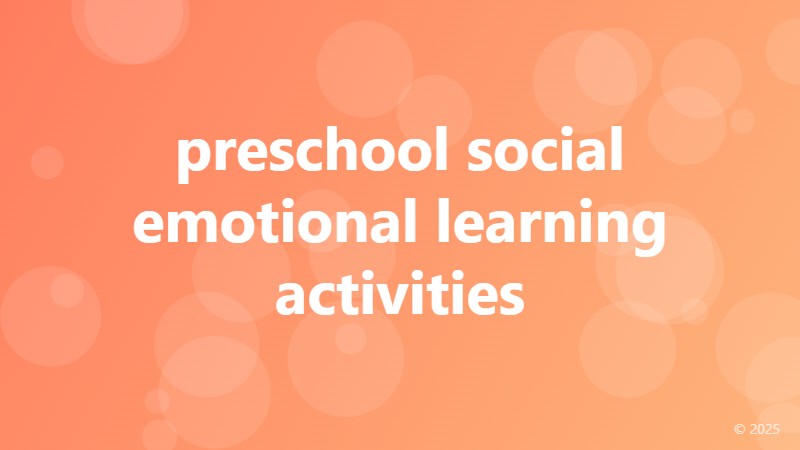preschool social emotional learning activities

Why Preschool Social Emotional Learning Activities Matter
Social emotional learning (SEL) is an essential aspect of a child's development, and preschool is a critical period to introduce these skills. By incorporating preschool social emotional learning activities into daily routines, educators can help young children develop essential life skills, such as self-awareness, empathy, and self-regulation. These skills are crucial for building strong relationships, achieving academic success, and maintaining good mental health.
Benefits of Preschool Social Emotional Learning Activities
Research has shown that preschool social emotional learning activities have numerous benefits for young children. Some of the most significant advantages include:
Improved academic performance: Children who develop strong social emotional skills tend to perform better academically and have better attendance records.
Better relationships: SEL activities help children build strong relationships with their peers, teachers, and family members, leading to a more positive and supportive environment.
Enhanced emotional intelligence: Preschool social emotional learning activities help children develop emotional intelligence, which enables them to recognize, understand, and manage their emotions effectively.
Increased empathy: By engaging in SEL activities, children develop empathy and understanding towards others, leading to a more harmonious and inclusive environment.
Fun and Engaging Preschool Social Emotional Learning Activities
Here are some fun and engaging preschool social emotional learning activities that you can try:
Feelings Charades: Divide the children into two groups and ask them to act out different emotions, such as happiness, sadness, or anger. The other group has to guess the emotion being portrayed.
Empathy Mapping: Create a large map with different scenarios, such as a friend falling down or a pet getting lost. Ask the children to identify how they would feel in each scenario and how they can help others.
Self-Portrait Collage: Provide the children with various materials, such as paper, glue, and crayons, and ask them to create a self-portrait collage. This activity helps children develop self-awareness and self-acceptance.
Sharing Circle: Gather the children in a circle and ask them to share a toy or object that holds sentimental value. This activity promotes sharing, taking turns, and empathy.
Conclusion
Preschool social emotional learning activities play a vital role in shaping a child's social, emotional, and academic development. By incorporating these activities into daily routines, educators can help young children develop essential life skills, build strong relationships, and achieve academic success. Remember, the key to effective SEL activities is to make them fun, engaging, and interactive, ensuring that young children develop a strong foundation for lifelong success.